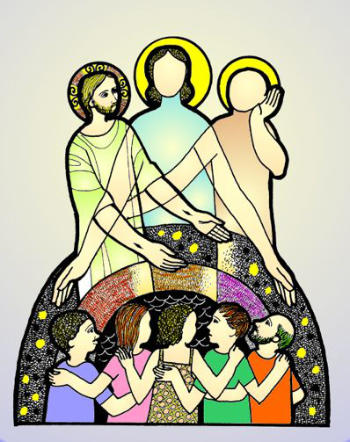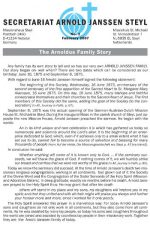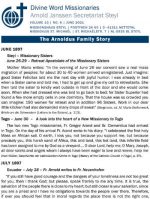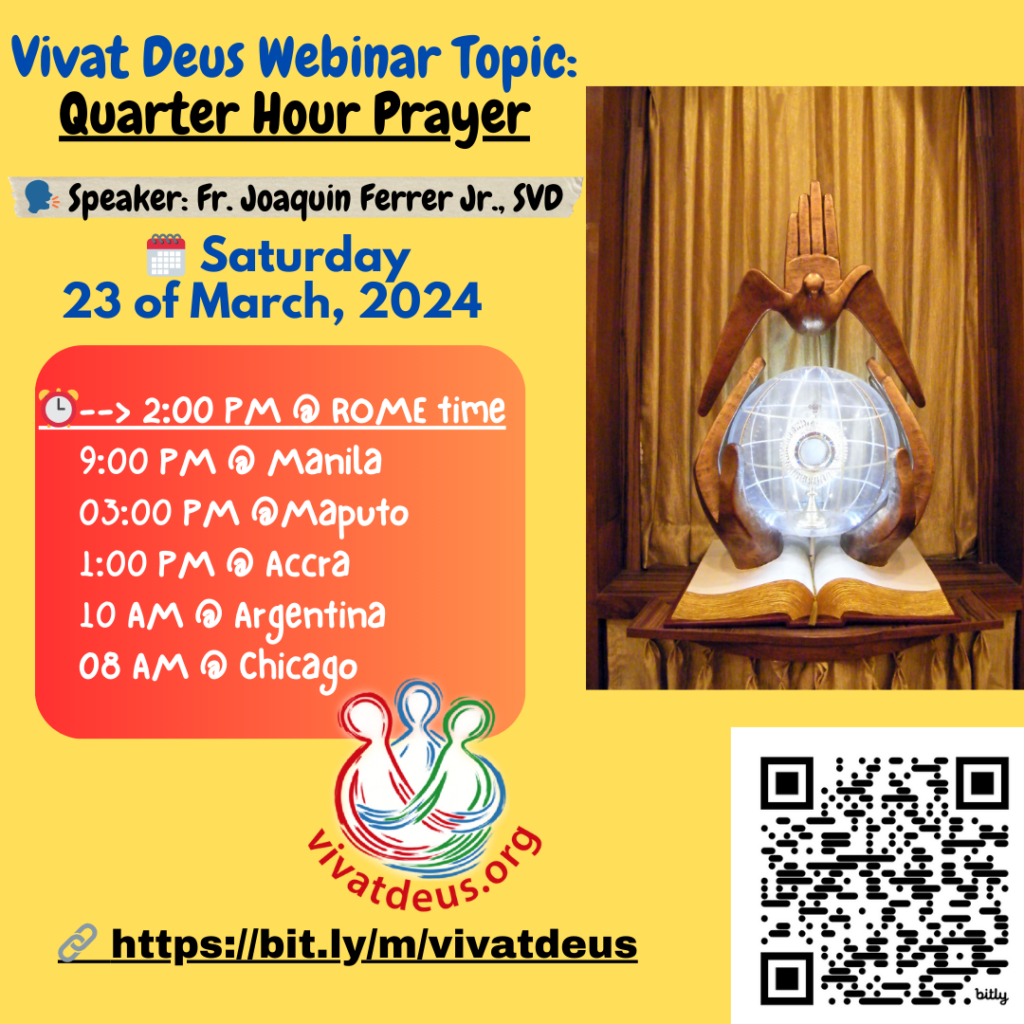-
THE PERSON
Aesop in one of his Fables tells of the argument between the North Wind and the Sun as to which one is the more powerful. As they argued they saw a man walking across the fields wearing a cloak. The North Wind suggested, by way of contest, that whoever could get the cloak off the man’s back would prove himself the more powerful. So the Sun hid behind a cloud and allowed the North Wind to try first. The North Wind blew a fierce blast and almost blew the cloak off the man, but the man caught it and pulled it tight. The harder the North Wind blew the more the man shivered and pulled his cloak tight. Finally the North Wind gave up. Then the Sun came from behind the cloud and gently and warmly shone on the man. After a few yards he loosened his cloak, and after a short while further he removed it completely. The mistake of the North Wind had been to concentrate on the cloak not the man; whereas the Sun had been interested first in the man, then the cloak.
The history of life in our community has tended to be more like the attitude of the North Wind. Emphasis was placed on the work; the person had to be fitted into the pattern or mold. Now, rather more like the Sun, our community life tries to emphasize the development of each individual person. We realize that a person can be fully herself only in a loving, sustaining community. This realization is clear from many different branches of knowledge today: sociology, psychology, philosophy. Mankind, says a Christian philosopher, is essentially «a community of persons in relation. » To be human means to be a person directed towards other persons. Our present Constitutions, following the lead of the Vatican Council, take this insight a level higher by linking man’s community orientation to his being an image of God Who manifests His being essentially and necessarily as Persons-in-relation. « The Blessed Trinity is the origin, the prototype, and the perfection of every community » (Cons. 301).
-
UNION OF LIFE IN THE BLESSED TRINITY
To understand the mystery of the Blessed Trinity better, theologians have used various models or illustrations taken from human experience. St. Patrick took the shamrock, for example. The ‘ Psychological or Personal Model ‘ of St. Augustine is the one that has had the most influence in the history of theology. It is based on the self-consciousness of a person. I know myself and form an Idea (or Image) of myself and I can rejoice in love and joy at this knowledge of myself. Similarly the Father knows Himself in the utterance of His Word (or Image) and from this loving Self-knowledge issues the Holy Spirit, the love of both Father and Son. Father Janssen often used this model in his talks. St. Augustine’s analysis of the individual soul as a Trinitarian image has served as the basis of individual piety and the spirituality of ‘ the inner way ‘. Many today want a spirituality based more on the human experience of community, where deep interpersonal relations have a formative role. Our model for a deeper understanding of the Trinity should be not only personalist but inter-personalist. Such a model Gather Janssen found in the writings of St. Bonaventure and placed it in the SVD Rule of 1898. It is too long to quote here and also very difficult. Father Janssen actually apologizes in the Rule for the difficulty of the passage. Very curious that Father Janssen would nevertheless quote St. Bonaventure at such length and that the General Chapter would accept it. Clearly it meant much to him. The gist of Bonaventure’s approach is this. If God is the fullness of perfection, then, he says, the quality of love, as indeed of all virtues, must be perfect in Him. Now the perfection of love consists not in Self-love; love must be directed to another, the Beloved. Such mutual love is still not the height of love; the fulfillment of mutual love demands shared love for a third. Bonaventure applies this to the Trinity: the dynamic of love within the Trinity thus proceeds from self-love (the Father’s love for Himself) to mutual love (the Father’s love for the Beloved, the Son, and His love for the Father), finally to shared love in the Holy Spirit:
LOVER — BELOVED – CO-BELOVED
(LOVE OF BOTH, SHARED LOVE)
The Blessed Trinity, then, should not be viewed simply as Three Kings on three equal thrones, equal in majesty, but rather in terms of this inter-relating dynamism of love. Unfortunately when Father Janssen submitted the 1898 Rule to Rome to be approved, he was told to remove this passage and all other quotations from the Scriptures and the Fathers. What we were left with, and this was true of the revision of the Sisters’ Rule made in the First General Chapter SSpS 1909-1910, was a dry, desiccated rule-book that told us what to do, when to do it and how to do it, but not why. Father Janssen’s spirit had been sacrificed to the spirit of legalism – at least until the Vatican Council made possible our revision of the Constitutions in the Sixth General Chapter, 1968. Here the real heart of the matter, the Blessed Trinity again becomes explicitly the heart of our missionary vocation, of our life in community. Of special significance in this aspect is Constitution 301 which, as we have seen, links our life in community to the mystery of the Blessed Trinity: « The Blessed Trinity is the origin, the prototype, and the perfection of every community. » The Chapter was pursuing the insight of Vatican II in GaudtUtm et Spes. The report of the Commission collating the reports from the provinces for this present General Chapter quotes the Council in the section on ‘ Community ‘: «Indeed the Lord Jesus when He prayed to the Father, ‘ that all may be one… as we are one ‘(Jn 17,21-22) opened up vistas closed to human reason. For He implied a certain likeness between the union of the divine Persons and the union of God’s sons in truth and charity. It follows then that man can fully discover his true self only in a sincere giving of himself » (No. 24). Genesis tells us that man was made in the image of God (Gen 1,26). Man is like God because he can know and love. Man can also work, can build, impose his plan on nature, can invent new things, and in this way shares in God’s creative power. But the Council goes further when it sees man as made in the image of a God who manifests His being essentially and necessarily a Persons-in-relation. Man is social because God Himself is social. Here lies man’s true dignity; here lies the reason Christ stressed love and community so much. That is why, too, Christ’s superhuman demand that we love all men, even our enemies and those who injure us, ends with the words « You will be sons of the Most High » (Lk 6,35). This sonship is not a reward for our heroic love; rather the reverse: because we are sons we can love like that. The Spirit makes us sons (Rom 8,14); He makes the Father and the Son one; He therefore is the great Animator of community, for it is in His fellowship that we share (2 Cor 13,13). This fellowship is not a group of persons, but it is more a quality of relationship, a sharing in the life of the Trinity. This ‘ fellowship of the Holy Spirit’ is the basis of our vision of and relation to: a) our fellow-sisters, b) all the people we are sent to serve.
-
LIVING GOD’S FELLOWSHIP IN COMMUNITY
It is impressive that the Constitutions (301) so emphatically and explicitly base our community life in the context of the Blessed Trinity. It was not so explicit in the 1968 SVD Constitutions. Only in the revised SVD Constitutions is it as clearly stated: «In our relationship to one another within the community we are an image of the Blessed Trinity from whom our own life and mission draw their source and strength» (Cons. 504, as revised 1978). Your Sisters in 1968 were wide awake! Because « in the one Spirit we were all baptized… and one Spirit was given to us all to drink » (1 Cor 12,13), then all strife and jealousy must be far from us. « The joy of one sister must be the joy of all, and the sisters should be happy if they can provide some joy for another sister. If we do this our community will resemble that of the first Christians; indeed, it will be an image of the heavenly homeland itself » (VII,7). We are to live as « sisters who are bound together in the Heart of Jesus and in the love of the Holy Spirit» (V,18). «Let the sisters love one another with true sisterly love and rather sacrifice their own desires than fail against charity » (1,12.5). Much can be said of community living since it involves the depths of each of us. It will mean varying things to different people, and even different things to the same person at various times and in different communities. The last General Chapter discussed our community life. Their reflections are worth meditating on in this context: confer Document, pp. 18-21. The basis of our community life must be « the fundamental human and Christian attitudes, respect for the dignity of the person and, even more, love. » « We realize that we need to complement one another and hence are open to give and to receive » (p. 20). Our Christian love urges us to give to the needy (Mt 25,35ff). Saint Paul’s analogy of the body, to which Father Janssen refers in the Rule on ‘ Good understanding among mature as a community. « Our bond of unity must show itself in love in its various forms: by attentiveness, by facilitating reconciliation, by a helpful deed, but also by patience and endurance » (Doc. p. 20; cf. also 1,13.6). Differences of opinion may remain but « our unity of spirit in the bond of peace » (Eph 4,3, quoted by Cons. 121 and 301) will be all the stronger. And no sister will feel what the poet John Clare expressed: « I am, yet what Iam, none cares or knows. »
-
REVERENCE FOR THE PERSON
Our vision of man as caught up in the mystery of the Blessed Trinity should give us a Christ-like view of people. The Constitutions stress as a fundamental principle of government: «Reverence for the personal dignity of each sister, a dignity she possesses because of her creation in the image of God and from her participation in the divine life » (Cons. 601). Reverence for her dignity a strong expression borrowed from Vatican II, and one which flows from our Trinitarian vision of man.«Just as Jesus Christ, the Good Shepherd, and God the Holy Spirit love us with a divine and ceaseless love, we should love our neighbor, and above all our fellow-sisters and those for whose salvation we are called to work» writes Father Janssen (1,7). Later he quotes St. John: « A man who does not love the brother that he sees cannot love God whom he has never seen» (1,13.4; cf. 1 Jn. 4,20). The quality of this love for others is seen in Christ Himself, to which we shall return, but its foundation lies here. Our name ‘ Servants ‘ ought to be a constant reminder to us, and a witness to others, of the dignity of each person. We are to see our service of others as a privilege. God has loved them; therefore, as St. Augustine says, they are lovable; therefore we love them and serve them. If we cannot see the dignity of a particular person, the cause is not that the dignity is not there, but rather that we cannot see it; our vision needs focussing! All men are called to form the family of God with us; we must share with all men as brothers and sisters of one family. This spirit of Christ-like sharing lies at the heart of our Vow of Poverty: « after the example of our Master we do not embrace poverty for its own sake but rather that through our generous love we may help our neighbor. It is a poverty which is selfless» (Cons. 209). It commits us as missionaries to identify with the whole human family which shows its poverty in many ways: lack of material goods, ignorance, loneliness, failure, anxiety and above all the poverty of «the darkness of sin and the night of unbelief ». Such a spirit of poverty is truly liberating, not from things but for people. « Keep in mind those who are in prison as though you were in prison with them, and those who are being treated badly since you too are in the one body » (Heb 13,13). The central message Christ came to bring was of God’s love, using the image of the Kingdom, that is, God’s rule over man and creation, and the blessings of love, joy and peace that flow from His rule. Since the Kingdom involved man in the mystery of the Blessed Trinity, Christ always described it in terms of human relationships and mutual responsibility. Adherence to the Kingdom means « to the new world, to the new state of things, to the new manner of being, of living, of living in community which the Gospel inaugurates » (Ev. Nuntiandi No. 23). Our missionary vocation is our radical, uncompromising commitment to Christ’s Kingdom and to its values. Specifically our vow of poverty is a statement of the real, ultimate values of life; a statement that the prime value in the world is the dignity of the human person in his relation to God, that human relations and classes of people are built not on an economic nor impersonal but deeply personal basis. A person’s value lies not in what he has, nor even in what he contributes to or produces for the community, but in himself, in what he is. Christ identifies also with the prisoners: «I was in prison (and justly so most times!) and you visited me » (Mt 25,36, quoted in VI,11.1). The ‘world ‘ (in the Johannine sense) urges the opposite, but our commitment as Servants goes directly counter to this ‘wordly spirit’, to see dignity and beauty in every man. As Father Janssen clearly states: «John writes: ‘ This is the victory over the world — our faith ‘ (1 Jn 5,4). This is certainly true of the faith which is active in love. These two virtues should be visible in the deportment of the sisters and in their work » (VI,11.4). « The greatest service religious can offer to mankind today,» once commented Father Arrupe, « is to give irrefutable witness against Consumerism. » It is a point well made. What is wrong in consumerism, of course, is not the acquisition of many things as though the mere having was bad in itself Rather, consumerism inverts right values. In a consumer society the central point is self. Other people are things to serve my purpose; the motive, profit; the moral norm, efficiency; and the means, whatever works. Our Vow of Poverty is a clear NO to this. It is a reminder of Christ Who came to serve as a poor man. « What matters is to evangelize man’s culture and cultures in a vital way, in depth and right to their roots and always taking the person as one’s starting-point and always coming back to the relationships of people among themselves and with God» (Ev. Nunt. No. 20). So «our solidarity with the poor urges us to work for social justice and peace, » states the Seventh General Chapter (Doc. p. 12). Thus our basic devotion to the Blessed Trinity when understood and lived in depth is not a mere pious devotion of my interior life with God; it commits us more deeply to man and his concerns.
-
OUR INTERNATIONALITY
One of man’s deepest concerns today, and therefore one of the ‘ signs of the times ‘ which should indicate our path, is the feeling of oneness, of the brotherhood of man, and the anguish caused by deep divisions of nationality, race and religion. In sharing with us the life of the Blessed Trinity Christ has established the possibility of family bonds that transcend all differences of race or nationality. «Through Christ all of us have in the one Spirit our way to come to the Father » (Eph 2,18). « God wills that all nations should be as sisters of one mind and as one big Christian family » says our Rule (VII,7.1). Our vocation is to share in «the mission of the Church, an efficacious sign and instrument of intimate union with God and of the unity of all mankind » (Cons. 101). We are to be a sign not just by preaching but by an attitude of mind that no longer recognizes divisive differences between nationalities but only those differences that complement, that enhance our community. Divisive differences cannot be tolerated. The Holy Spirit desires to lead all nations into the one People of God; we are pledged to His service. Our international community, where it is truly lived united in the Holy Spirit, is already a sign of that Kingdom breaking out. That is why the Seventh General Chapter considered «our international character an essential quality which should continue to determine the life and work of our communities » (Doc. p. 8). This is indeed one of the most significant aspects of Father Janssen’s heritage — some would call it the most significant. Tensions undoubtedly will be caused and will lead to divisions. The Chapter acknowledges this fact of life, but correctly expresses a positive outlook, pointing out the possibility for growth inherent in those tensions. And the solution comes back again to the fundamental principle: love and respect for the dignity of the other person. None would disagree with this principle, yet one does come across cases of missionaries who have served a people, perhaps for many years, yet who have allowed a negative outlook to become habitual. A prudent mother recognizes the faults of her child, but does not allow such to color her whole attitude to her child. To see more of the negative or bad side in others means that our vision needs focussing. A woman used often complain about her neighbor. « See, » she said one day to a friend visiting her, «even the washing on her line is dirty!» « Perhaps, » replied her friend, « your windows need cleaning. »
-
CONCLUSION
Thus genuine devotion to the Blessed Trinity, when it means allowing the love and ideals of the Blessed Trinity to penetrate my life, to become, in fact, the source of my own love and ideals, influences my whole approach to life, my vision of man. By our Profession we have publicly acknowledged this to be our shared vision, the common motivation of our lives and work together. Sukarno, writing of his nation (in «The Basis of the State of the Republic of Indonesia») stated: «How wonderful to have a Gotong-Royong state» (literally — to carry heavy burdens together). His statement could lie at the basis of our vocation. St. Paul has a similar state- ment: «Carry one another’s burdens» (Gal 6,2). Our present Constitutions quote him (Cons. 304), and the 1891 Rule also refers to this passage (1,12.5). Further Father Janssen asserts: « Sisterly love is a staff and powerful support in all difficulties and sufferings» (1,13.5). In the Philippines I was once amazed to see a group of 25 to 30 men carrying a large house along a road, bearing it on long bamboo poles. Such a thing is not uncommon, and the spirit shown, «the Bayanihan spirit», typifies a value very precious in the Filipino way of life. In one of our churches the tabernacle was sculptured in the form of a Filipino house being carried by a group of men. A very impressive sculpture because it recalls the very Source of our Bayanihan spirit, of our carrying heavy burdens together, Christ our Lord.
From the book “The Spirituality of our Founder and of our Congregation” – p. 24-38







